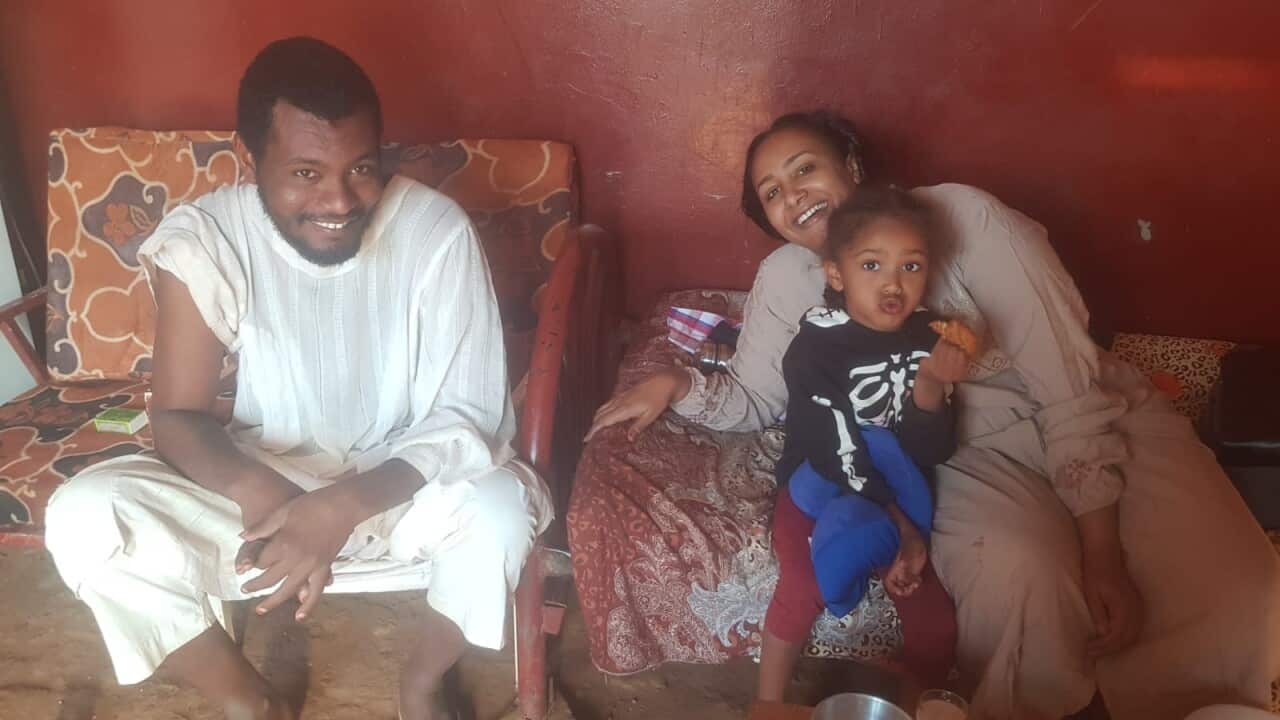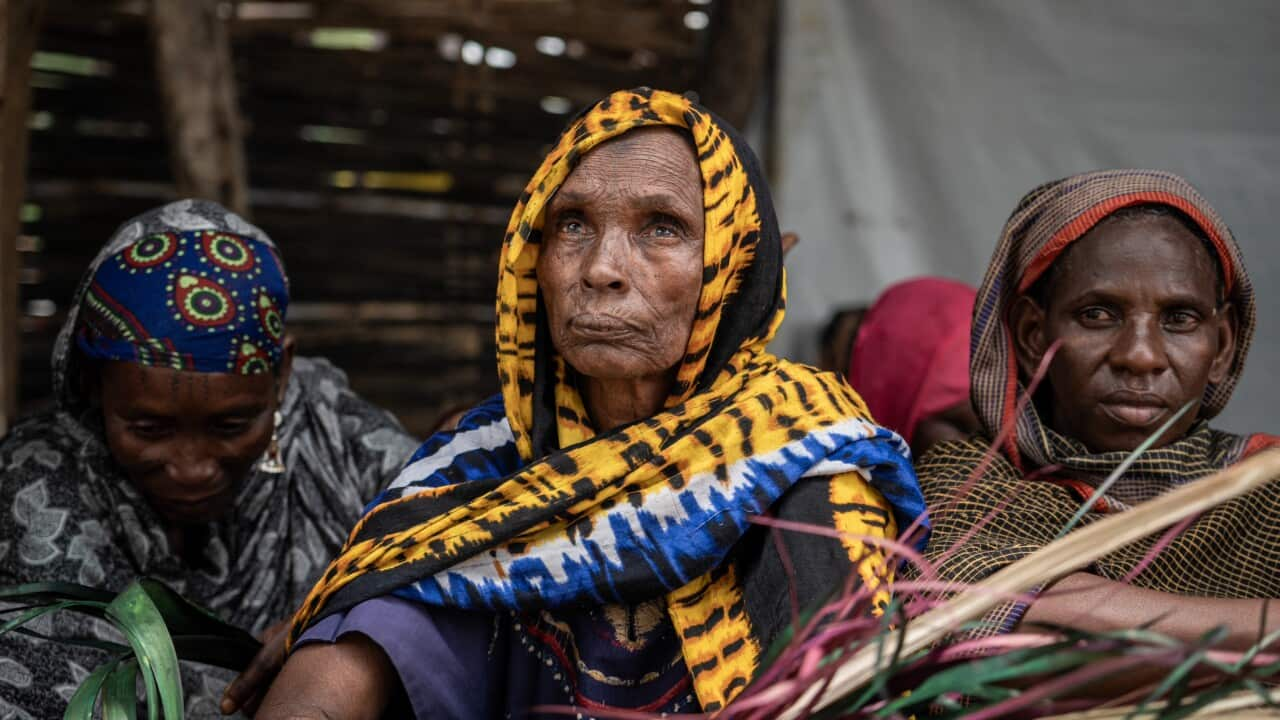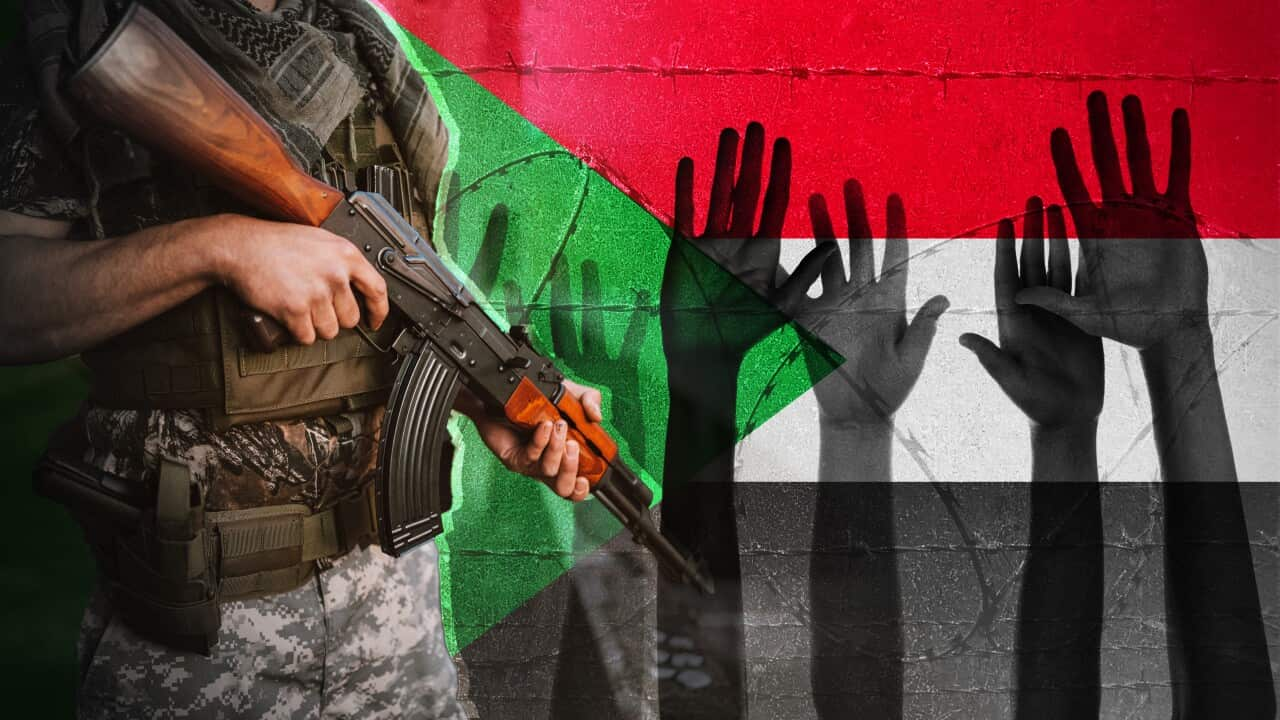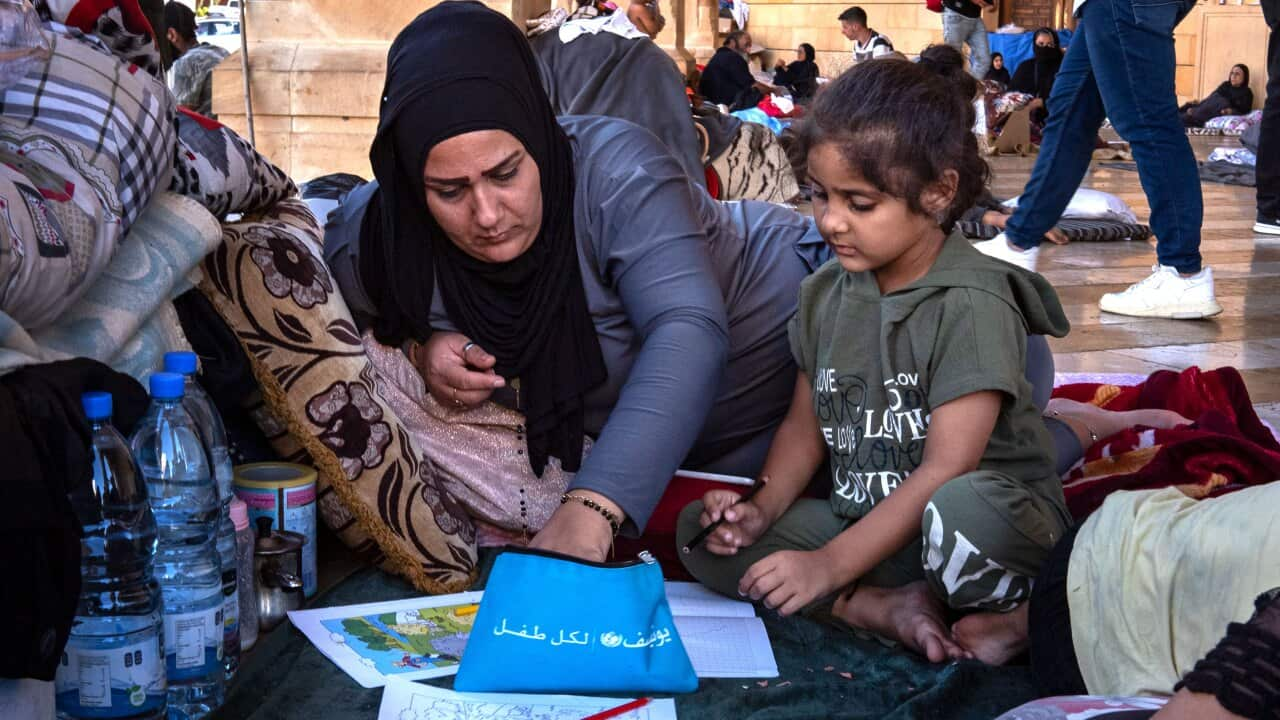This story contains references to physical and sexual violence
For Sydney-based support worker and single mother of four Azza Elssaid, the past few weeks have been agonising: She's hardly slept, anxiously awaiting news of her brother Ibrahim.
In October, members of her family were wounded and displaced in a violent rampage in her hometown of Tamboul in Sudan: 12 people have died as a result of the attacks, including her nine-month-old cousin.
"Everyone who is dead, I have a memory with," Elssaid says.
It's like a nightmare.

Azza Elssaid says her nine-month-old cousin Ibtihal died after being displaced by the RSF attacks. Source: Supplied
According to reports from news agency AFP, the attacks have left over 1,000 people dead.
Elssaid’s 27-year-old brother Ibrahim was also caught up in the attacks on Tamboul. He was captured by militants, who are now threatening to kill him if Elssaid’s family do not pay his ransom.
Displaced, killed and held to ransom
Since April 2023, the RSF has been embroiled in a devastating war against the Sudanese army, which has torn Sudan apart and displaced large swathes of its 50 million-strong population.
Around 8.1 million Sudanese people have been internally displaced by the conflict, according to the United Nations, while another three million have fled to neighbouring countries. More than half the population (25.6 million people) are currently in need of humanitarian aid — making it the in the world.
The latest assault on Al Jazirah was triggered when a top RSF commander from the area, named Abu Aqlah Keikel, surrendered himself and his fighters last month and switched allegiance to the Sudanese army.
"He's joined the Sudanese army, which makes them angry and hateful," Elssaid explains.

Azza Elssaid says she's terrified the RSF militants will kill her brother with or without the ransom paid. Source: SBS News
Following the attack, Elssaid heard nothing from her brother Ibrahim and feared he may have been killed.
Two weeks later, the silence was finally broken: his desperate pleas for help can be heard in voice messages sent via WhatsApp to Elssaid's family. "These people are killing two or three people every day and they want 50 million pounds ($125,000)," he told them.
"I am fine, thank God; I am not hurt but the situation is dangerous, and I am in danger."
In another voice memo, an unidentified person, presumed to be an RSF militant, addresses Elssaid’s family, saying: "You send us the money, your man will be okay.
"You don't send us the money, we will send him to you dead. This is our final word."
Speaking with SBS News, Elssaid says the militants have refused to negotiate in follow-up calls and she's petrified because her family cannot afford the ransom.
My family are now refugees, we do not have this money.
Her feelings of powerlessness and guilt are compounded by the last conversations she had with her brother before the violence broke out.
"He kept calling me weeks ago saying he wants to run away from Sudan — he wanted to go to Egypt, he wanted to start a new life," she says.
"[But] my dad is an old man and he needs him [Ibrahim] and he has diabetes. I told him, 'stay with my dad'.
"If he dies or anything happens to him, I'll feel guilty."
LISTEN TO

Sydney woman Azza has lost family members to deadly violence in Sudan
SBS News
29/10/202408:43
Escalating violence
More than 120 villages and towns in Al Jazirah have been affected by RSF raids, according to local activists. The United Nations estimates some 135,000 people have been displaced as a result.
Local activists have also reported at least 124 people were killed in initial attacks on the neighbouring village of Al-Sireha, while Sudanese rights group Middle Call has reported more than 300 residents killed in the nearby town of Al-Hilaliya in the past two weeks alone.
The UN's human rights office has also confirmed at least 25 cases of sexual violence, including an 11-year-old girl who died as a result. The office also noted the RSF had confiscated internet devices in at least 30 villages and burnt fields of crops.
Ahmed Abdelatif, Sudan's chargé d'Affaires to Australia, told SBS News these attacks will only worsen food insecurity in Sudan, where close to 26 million people are suffering from crisis levels of hunger according to UN estimates.

Sudan's top diplomat to Australia Ahmed Abdelatif has condemned the RSF violence in Al-Jazirah. Source: SBS News
"I believe the rebellious militia systematically planned to have genocide in Al Jazirah area to respond to the joining of one of its main leaders who was controlling the area of Al Jazirah to the National Army."
Dr Ahmed Maglad, a spokesperson for the Sudanese Australasian Medical Professionals Association, says this kind of conduct from the RSF is familiar.
"This is a trend that happens every two to three months that we see. They get upset about something and then they take a very dramatic revenge — they hijack a small town or a village," Maglad says.
"After they arrive, they rob, they kill men — whoever resist[s] them — they rape women, they clean the houses of every valuable thing.
The last thing they do is that they burn: they burn villages, they burn crops.
Azza Elssaid also attests to the violence of the RSF, telling SBS News a member of her family member was raped during one of the attacks, while her cousin, Wad Alshareef, was killed while trying to protect his sheep.
'A forgotten crisis'
The attacks in Al Jazirah represent a small sample of the violence that has devastated Sudan over the past year and a half. As well as the millions displaced, an estimated 24,850 have been killed, according to the Armed Conflict Location and Event Data group, which has been monitoring the conflict.

Pictured: Elssaid’s aunties and close cousins who have been displaced by the fighting and have fled to New Halfa. Source: Supplied
"This is one of the most acute crises there we're facing globally, and yet it is a forgotten crisis," he says.
"It is the largest displacement crisis in the world: we have levels of food insecurity that we have almost never seen, certainly not in a generation.
Sudan needs the same level of attention as Gaza and Lebanon.
Maglad, who's now based in Melbourne, was in Sudan's capital Khartoum at the start of the war, helping the sick and wounded.

Dr Ahmed Maglad escaped from the war in Sudan with his family. Source: Supplied
"If you are a doctor, you are automatically detained. I have my cousin, he's been detained since April last year. Until now, we don't know his whereabouts. They [the RSF] take you with them so you work as a private doctor for the injured ones."
Maglad says he still struggles with a feeling of guilt after making the difficult decision to leave Sudan just months into the conflict to bring his family to safety.
"I still remember the moment I left the hospital with so many on the beds, on the floor, in the corridors and they were looking at me," he recalls.
"They know I am leaving and there's no other doctor coming and it was just a total disappointment in their faces."
Loved ones in limbo
As the conflict rages on, Azza Elssaid is still awaiting news of her brother’s fate. Despite the tremendous emotional burden, she says she's been able to find support and connection through Sydney’s Sudanese Australian community.
"I couldn't go to my job, I couldn't take care of my kids properly and I couldn't even eat or have a shower or do nothing … But I have lovely friends around and lovely community supporting me," she says.
"[They] keep asking about me, bringing food to me and hugging me. I'm very thankful to them for that."

Azza and her friend Omer Ahmed, with Azza’s two-year-old daughter Mariam. Source: SBS News
"I am very sad, and I can't do anything. I don't know where my family are," he says.
"Where is my mother and brothers? I don't know anything about them."
Elssaid's 80-year-old diabetic father has been displaced multiple times in the attacks and was forced to walk for days in the heat each time to reach safety.
She says it's been incredibly difficult to hear of her family's suffering over WhatsApp voice messages while feeling powerless to help them.
"When I hear these stories it makes me just wanna go. I just wanna go. When I see my kids happy, eating, safe, secure, it makes me happy, but makes me guilty at the same time because my family [and] the man who brought me to this world, he's suffering. He's hungry."












